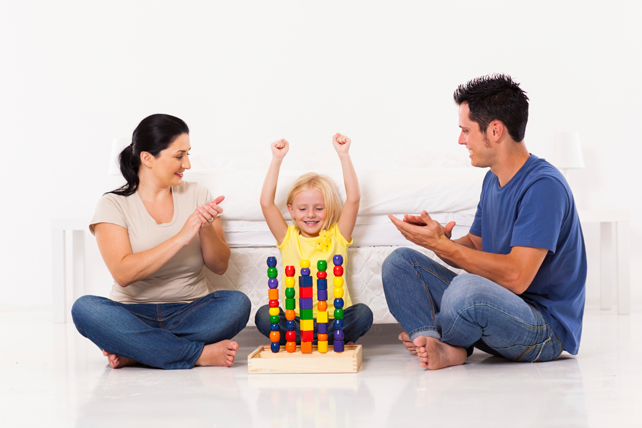Good Praise v. Bad Praise – What You Need to Know

SHARED by: Leigh Goldman, Gymtime Mom
We’ve all witnessed one of those cringe-inducing moments when a parent praises a child for some non-event – say a 10-year-old who finishes a glass of milk or throws her trash in the garbage. In our overzealous efforts to boost kids’ self-esteem – a critical component for successfully navigating the real world – we sometimes go overboard with praise. And that can have detrimental effects, according to a new study from Ohio State University.
The research, published in the Proceedings of the National Academy of Sciences, says too much parental praise can lead to narcissism. Overvaluation of minor “accomplishments” can give a child an inflated ego and a sense of entitlement. According to the researchers, when you overpraise, you’re sending the message your child is superior. However, that’s not to say excessive praise is the only cause of narcissism. Genetics and a child’s temperamental traits also play a role.
Narcissism vs. Self-Esteem
Although too much praise was highly correlated with narcissism, it was not an indicator of self-esteem, which the study found was linked with parental warmth and appreciation. So what does this mean? In a news story published on the Ohio State website, Brad Bushman, co-author of the study and professor of communication and psychology, said, “People with high self-esteem think they’re as good as others, whereas narcissists think they’re better than others.”
The Ohio State study – with 565 children ages 7-11 from the Netherlands – also suggests that narcissism carries over into adulthood and can even lead to aggressive and violent behavior. In addition, narcissists are at a greater risk for developing depression, anxiety and drug addiction.
This latest study is part of a growing body of research analyzing the effects of praise on development.
“Unintelligent” Praise
In the 2009 parenting book “NurtureShock: New Thinking About Children,” authors Po Bronson and Ashley Merryman looked at The Inverse Power of Praise. They discussed lab studies conducted by renown psychologist Carol Dweck (with Columbia University at the time), which showed that when you excessively praise a child for being intelligent, she/he learns that they can get by on their natural talents and don’t need to expend any effort to succeed. You’ve “stigmatized” effort and potentially set up the child to fail. Dweck highlighted that when you emphasize effort, you’re giving a child a variable she can control.
Dweck, now with Stanford University, has been studying achievement and success for 20 years and stresses the importance of the “growth mindset,” a concept she developed. Effort is part of that growth mindset and is key for motivation, resilience, grit and productivity. Although praising a child’s intelligence can be harmful, healthy praise related to effort, process, strategy, concentration, follow-through and specific ideas is okay. This is the kind of praise that empowers.
The Credibility Quotient
Psychologist Wulf-Uwe Meyer found that only kids younger than seven actually take praise at face value. But then things change. In his research observing students and teachers, Meyer discovered that by age 12, kids viewed praise from a teacher as a negative – a sign that the student being complimented needed the encouragement and lacked ability.
Think about how excessive praise can play out at home. When you’re always telling a child “good job,” you dilute the power of your praise, and it becomes an empty compliment. Your child may start to question whether you’re continually dishing out the à la carte accolades because you view her as incompetent, especially when the praise doesn’t appear to be linked to a worthy accomplishment. And because your kids are savvy New Yorkers, they’ll likely be onto you fairly quickly! So be sure you’re equally savvy with the praise.









